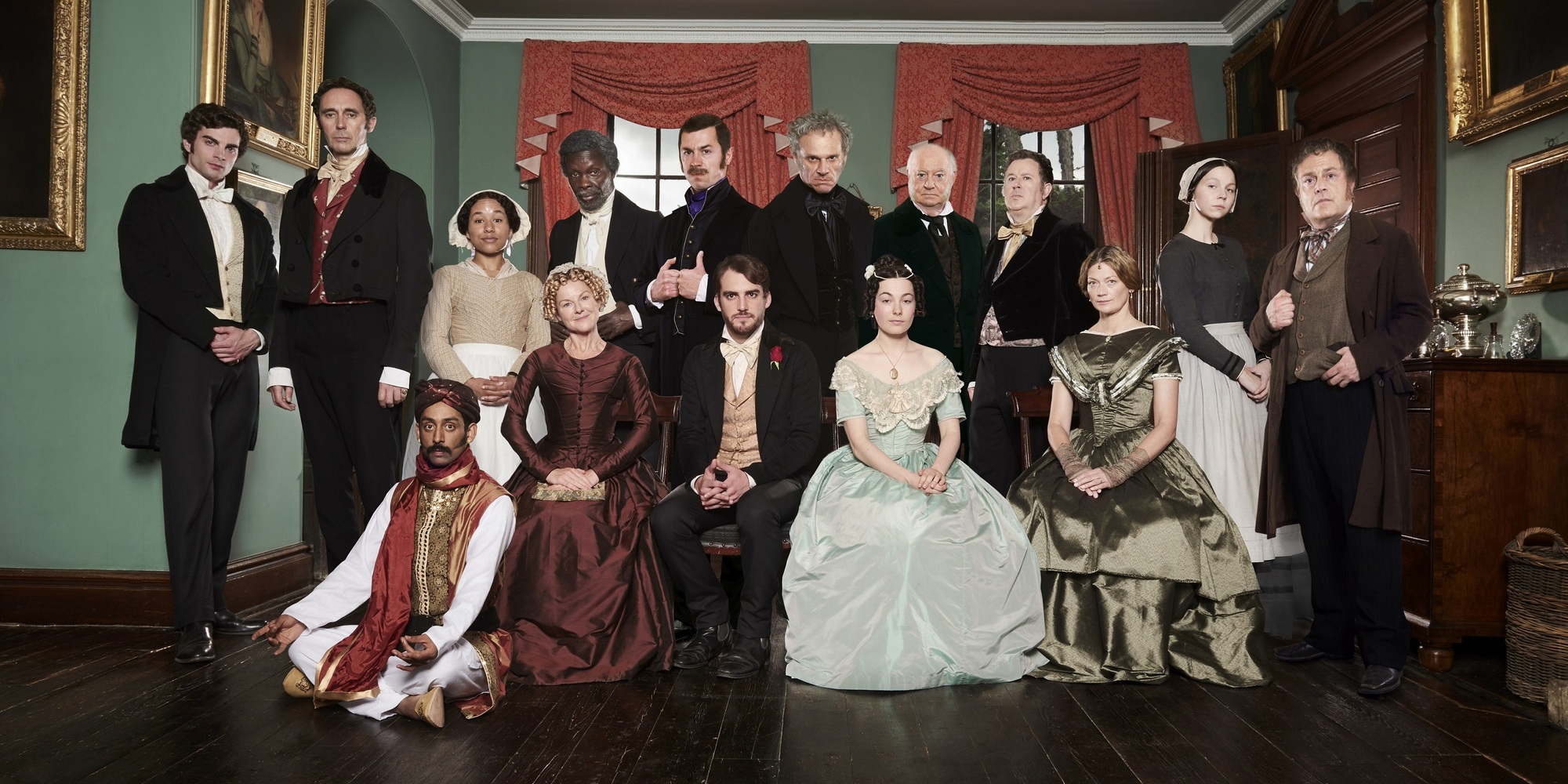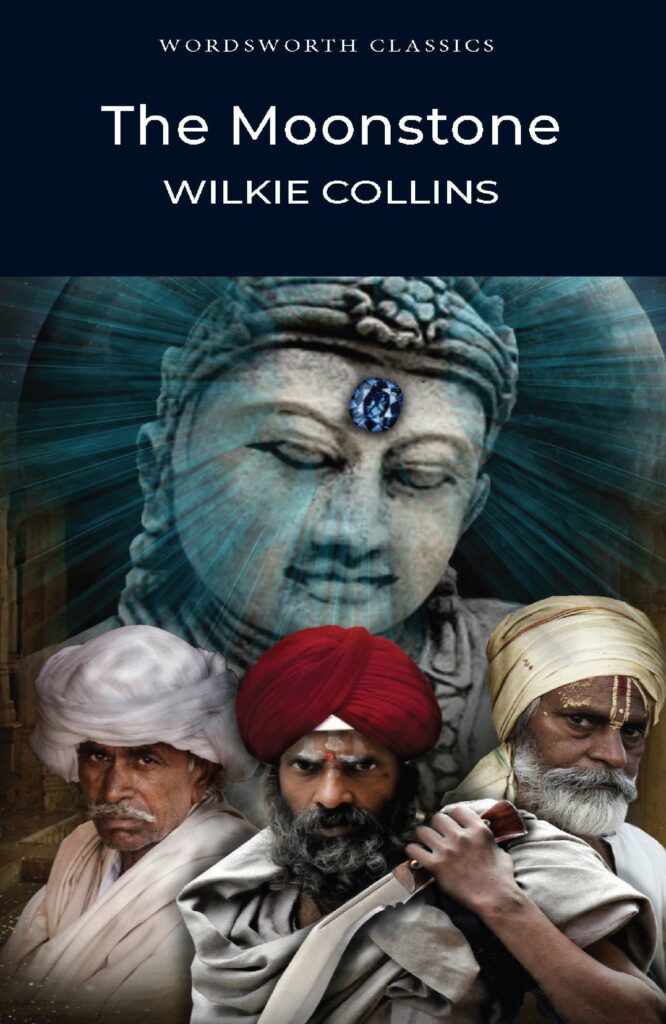
Wilkie Collins ‘The Moonstone’ – we review the BBC production
Wilkie Collins’ classic mystery novel ‘The Moonstone’, concerning the theft of a precious Indian jewel, has always been a popular choice with dramatists.
David Stuart Davies reviews the latest adaptation.
‘In the last year of the 18th Century, Colonel John Herncastle plundered from India a priceless most sacred yellow diamond. Vishnu the Preserver laid his curse on the thief, commanding three priests to search forever for his Moonstone. The wicked Colonel smuggled the stone to England and kept it jealously. In his will, he bequeathed the diamond to his beautiful young niece, Rachel Verinder. Rachel’s gallant cousin, Mr Franklin Blake, was charged with the gem’s delivery. But was it a gift or a curse?’
Wilkie Collins’ classic mystery novel The Moonstone, concerning the theft of a precious Indian jewel, has always been a popular choice with dramatists. Shortly after the book was published in 1868, there was a stage version. Hollywood produced a film adaptation in 1934. The BBC has been particularly fond of the novel: apart from several radio versions, The Moonstone has been adapted for television four times; in 1959, 1972, 1996 and 2016. Indeed, the BBC has been attempting to get a new adaptation of The Moonstone off the ground since at least 2011. This latest version was televised each weekday afternoon in 45-minute episodes (31`October – 4 November 2016), and was aimed at a younger audience as part of the BBC’s LoveToRead season. Alison Graham in the Radio Times observed, ‘It’s a great book… but it’s just not the kind of story that would find its way to the heart of the big schedules again.’ This is probably because the novel is convoluted and complex, constructed from various diaries, letters and narratives supplied by key witnesses to the theft of a stolen gem and as such very different from the various dramas that currently fill the evening slots with their brief scenes and linear plots, which require shorter attention spans.
The new adaptation by Rachel Flowerday and Sasha Hails keeps faith with Collins’s multi-voiced narrative by making a different character the focus of each episode. What is so impressive and interesting about the scripting is that the writers have managed to explore the rich tapestry of the novel, which, while being trumpeted as a classic whodunit, is much more than a simple detective tale, as this adaptation reveals. Five forty-five-minute episodes provide the time for each of the chief protagonists to convince as fully rounded characters. Also, the writers have so constructed their version that four of the five episodes end on a cliffhanger urging the viewer to tune in for the next instalment. Indeed Flowerday and Hails have tapped into the incipient suspense elements of the plot and enhanced them. Even as the final episode raced to its conclusion, the resolution of the mystery and the exposure of the guilty party seemed uncertain. However, the problem with such a lengthy adaptation which was able to involve many of the nuances of the novel as well as the key elements of the plot, is that this detailed presentation also exposed its weaknesses. For example, the very convenient coincidences do tend to stretch the credibility of the narrative at times. Also, the rather risible explanation concerning the theft of the diamond, which revolves around the taking of laudanum, is drenched in implausibility. In creating this element of the plot, Wilkie Collins had been writing from personal experience. In his later years, the author became severely addicted to the drug and as a result, suffered from paranoid delusions, the most notable being his conviction that he was constantly accompanied by a doppelganger he dubbed ‘Ghost Wilkie’. Inspired by his hallucinations, Collins worked his own drug demons into the denouement of The Moonstone. The reliance on laudanum is described by one character in the drama as ‘like an inebriate who cannot find his way home until he takes his next drink.’
One interesting change in this new production was the restructuring of the novel’s timescales. In the television adaptation, the main events were seen as a flashback a year after the theft of the Moonstone. So when the drama begins, the adventurous hero, Franklin Blake, played brilliantly by Joshua Silver, has already had his reputation ruined because circumstances clearly indicated that he was the thief. Thus the drama focuses on his attempts to prove his innocence and apprehend the real culprit. This approach works well. One must remember that a novel is a novel and not a dramatisation. What is effective on the page is not always appropriate for a drama. Therefore some changes and additions along with some clarifications must not only be expected but required.
Despite its Cinderella daytime slot, the production values for this drama were excellent as was the atmospheric photography, which was supported by subtle lighting changes: dark for the gloomy present, bright for the more cheerful past. The various dimly lighted interiors created the period beautifully. All the principal players were excellent: in particular Terenia Edwards as Rachel Verinder, our tortured heroine, and Sarah Hadland as Miss Clack who proved that she is not only adept at comedy roles but can convince as a sour and sinister creature whose machinations are purely cruel and selfish. Hadland observed that her character ‘sees herself as a devout Christian and ‘do gooder’, always thinking of others… however she is actually an interfering, manipulative little busybody who has an unholy obsession with Godfrey Ablewhite.’
Betteridge, the old family retainer, who in the novel is presented as a stoical Yorkshire man was played with great charm and sensitivity by black actor Leo Wringer. By contrast, John Thompson (fresh from Cold Feet) wasn’t given sufficient screen time to establish the powerful eccentricities and detective acumen that Sergeant Cuff deserves. The character seemed almost to have been introduced as an afterthought. Certainly, he did not achieve the memorable elements of Antony Sher’s fruity turn in the 1996 version of the novel. This side-lining of Cuff may have been deliberate on the writers’ part in order for them to concentrate on the dilemmas of Rachel and Franklin.
If you missed The Moonstone, you may still catch it on the BBC iplayer if you are quick, One hopes that this charming production will open the door for future classic dramatisations, for daytime viewing, including those by Collins himself, whose other masterpiece, The Woman in White, we hear on the grapevine, is currently being adapted for a similar treatment.
Books associated with this article
